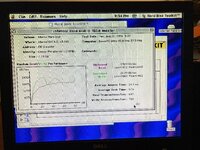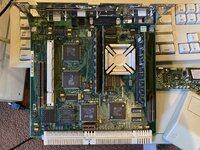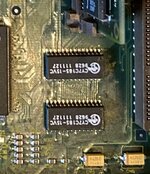bigmessowires
Well-known member
Just for grins I ran FWB Hard Disk Toolkit on my Performa 6214 (75 MHz PPC 603), and used it to bench test the internal hard disk. It's a 1.2 GB Conner IDE.

Aren't those numbers much lower than you'd expect? 1789 KB/sec sustained read? That's the slowest sustained read speed of any hard disk in HDT's database, and the only thing slower is a ZIP disk. I thought the IDE drives in these computers were supposed to be slightly faster than a comparable SCSI drive from the same era. To pick a random comparison, HDT's database has a 6GB WD 36400 IDE hard disk benched at 7435 KB/sec sustained read and 5615 KB/sec sustained write.
Should I consider replacing the HD? Maybe I need to use a different IDE driver?
Side commentary: HDT mis-identifies the computer's CPU type and speed, or else I'm wrong about what computer I have.

Aren't those numbers much lower than you'd expect? 1789 KB/sec sustained read? That's the slowest sustained read speed of any hard disk in HDT's database, and the only thing slower is a ZIP disk. I thought the IDE drives in these computers were supposed to be slightly faster than a comparable SCSI drive from the same era. To pick a random comparison, HDT's database has a 6GB WD 36400 IDE hard disk benched at 7435 KB/sec sustained read and 5615 KB/sec sustained write.
Should I consider replacing the HD? Maybe I need to use a different IDE driver?
Side commentary: HDT mis-identifies the computer's CPU type and speed, or else I'm wrong about what computer I have.


